(word完整版)八年级上册英语寒假作业
初二寒假作业
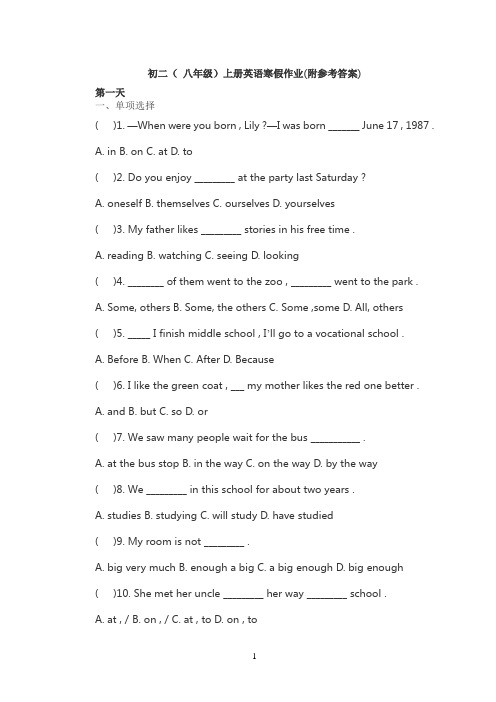
初二(八年级)上册英语寒假作业(附参考答案)第一天一、单项选择( )1. —When were you born , Lily ?—I was born _______ June 17 , 1987 .A. inB. onC. atD. to( )2. Do you enjoy _________ at the party last Saturday ?A. oneselfB. themselvesC. ourselvesD. yourselves( )3. My father likes _________ stories in his free time .A. readingB. watchingC. seeingD. looking( )4. ________ of them went to the zoo , _________ went to the park .A. Some, othersB. Some, the othersC. Some ,someD. All, others( )5. _____ I finish middle school , I‘ll go to a vocational school .A. BeforeB. WhenC. AfterD. Because( )6. I like the green coat , ___ my mother likes the red one better .A. andB. butC. soD. or( )7. We saw many people wait for the bus ___________ .A. at the bus stopB. in the wayC. on the wayD. by the way( )8. We _________ in this school for about two years .A. studiesB. studyingC. will studyD. have studied( )9. My room is not _________ .A. big very muchB. enough a bigC. a big enoughD. big enough( )10. She met her uncle _________ her way _________ school .A. at , /B. on , /C. at , toD. on , to( )11. Last Saturday , we visited _________ house in the country .A. the GreenB. the Greens‘C. GreensD. the Greens( )12. Mr. Smith ________ an hour on this work .A. spentB. tookC. usedD. paid( )13. The visitors _________ here two hours ago .A. arrived inB. got toC. arrivedD. arrived at( )14. _______ do you want to be when you grow up ?A. WhatB. HowC. WhoD. When( )15. We can do more English listening and speaking in a _____ .A. computer roomB. physics labC. language labD. reading room二、阅读理解Mr. Jones and Mr. Brown worked in the same office . One day, Mr. Jones said to Mr. Brown ,―We are going to have a small party at our house next Wednesday evening . Would you and your wife like to join us ?‖Mr. Brown said ,―Thank you very much . That is very kind of you . We are free that evening . I think , but I will telephone my wife and ask her . Maybe she wants to go somewhere else that evening .‖So Mr. Brown went to the other room and telephoned . When he came back , he looked very sorry .―What is the matter ?‖said Mr. Jones .―Did you speak to your wife ?‖―No ,‖answered Mr. Brown ,―She wasn‘t there , my small son answered thetelephone . I said to him ,‗Is your mother there , David ?‘and he answered ,‗No , she is not in the house ,‘‗Where is she then ?‘I asked .‗She is somewhere outside .‘‗What is she doing ?‘‗She is looking for me .‘‖( )1. A small party will be held _________ .A. at David‘s houseB. at Mr. Brown‘s houseC. in the officeD. at Mr. Jones‘ house( )2. Mr. Jones asked _________ to the party .A. Mr. BrownB. Mrs. BrownC. Mr. and Mrs. BrownD. all his friends( )3. The telephone was ________ .A. in the same officeB. in a room next to the officeC. in the post officeD. near Mr. Jones‘ house( )4. Mr. Brown spoke to _________ on the phone .A. Mrs. BrownB. Mrs. JonesC. DavidD. David‘s friend( )5. Why was Mrs. Brown looking for David ? Because _________ .A. he went out of the houseB. he was answering Father‘s phoneC. she knew David had lost his wayD. she thought he was playing somewhere outside第二天一、按要求完成句子1. 直到昨天下午5点,我们才离开公园。
八年级英语上学期寒假作业,八年级英语寒假作业答案

八年级英语上学期寒假作业,八年级英语寒假作业答案一.1.wolves2.beginning3.wears4.least5.tasty6.nowhere7.pleasant8.Climbing9.crazy 10.without二.1.D2.B3.A4.B5.B6.B7.A8.D9.A 10.A 11.B 12.A三.1.with2.from3.in4.at5.of6.for7.in、for8.in9.with 10.by四.1.practicing2.were3.will die4.didn t watch5.smoking6.are getting7.lost8.keep9.lying10.to watch五.1.Don t open when driving2.won t camping it rains3.leave five-year-old on own4.The ninth the same as5.make noise to do六.1.C2.B3.A4.A5.A6.C7.D8.D9.A 10.D一.1.Leaves2.activities3.ninth4.worried5.beautyeful7.amazing8.less9.better 10.weight二.1.have less than2.is helpful to3.spend better results on4.as interesting as5.Luckily put out6.took a trip famous三.1.A How far2.B Are3.B not talk4.B /5.B so much6.B doesn t like7.B to answer8.B will be9.B isn t10.D on四.1.C2.B3.C4.B五.1.policeman2.E-dog3.frog六.1.more helpful than2.Did enjoy themselves3.keeping secret between4.the same as5.less time by coach6.isn t on is it一.1.quietly2.fit3.popular4.finishes5.twelfth6.word7.twice8.lost9.medals 10.save二.1.C2.C3.D4.A5.B6.B7.C8.B9.B 10.B三.1.the same as mine2.different from3.Be careful with hurt4.Make sure closed5.hurt stay in hospital6.lost their lives7.should in danger8.is getting smaller smaller四.1.herself2.theirs3.me4.themselves5.them6.yourself8.Its9.Our 10.his五.best fit exercise learn alone took beautifuul dangerous choose mmakes六.1.D2.B3.A4.D5.D一.1.feeding2.feathers3.close4.readers5.borednguages7.report8. themselves9.smell anizing二.1.in2.about3.on4.from5.as6.of7.of8.on9.for 10.in三.1.the most popular2.telling so much funny3.saved out of ago4.has problems5.much pay for6.good at telling so happy7.protect won t survive8.live up to四.1.finish2.to speak3.brushes4.is5.is flying6.is having7.watching8.will reach9.stops 10.to chat五.1.B2.A3.A4.B5.C6.D7.A8.D9.B 10.C六.exciting famous the-most-popular interesting cleaner more-beautiful the-nicest more一.1.interest2.hunters3.keep4.farmlands5.hungry6.solve7.ourselves8.Wednesday9.less 10.teeth二.1.playing2.worries3.is blowing4.is trying5.happened6.will watch7.Keep8.to feed9.is washing 10.looks三.1.B2.B3.B4.A5.B6.B7.A8.C9.D 10.A 11.B 12..B四.1.B2.C3.C4.D5.D6.A7.C8.B9.A 10.C五.1.Youth Award.2.He is very helpful.3.Yes,he is.4.He quickly jumped into the water and did his best to save the boy.5.Zhang Li.一.1.thinner2.closed3.heroes4.advertisements5.actions6.bamboos7.living8.smlilng9.most busy 10.weight二.1.less than2.taught himself3.as as4. What about5.belongs to6.Are able to7.shorter than8.is favourite9.on foot10.by himself三.1.on2.on of3.out of4.at5.in6.in7.on8.around in9.through 10.at四.smoke away knocked called through could helped arrived out thanked五.1.stopped2.did find found3.got4.died5.were was6.will be7.felt8.is waiting9.go 10.will meet六.1.D2.C3.A4.C5.B一.1.C2.A3.B4.A5.C6.C7.A8.C9.A 10.D二.1.B2.C3.B4.D5.A。
2023-2024学年人教版英语八年级上册寒假作业(一)+
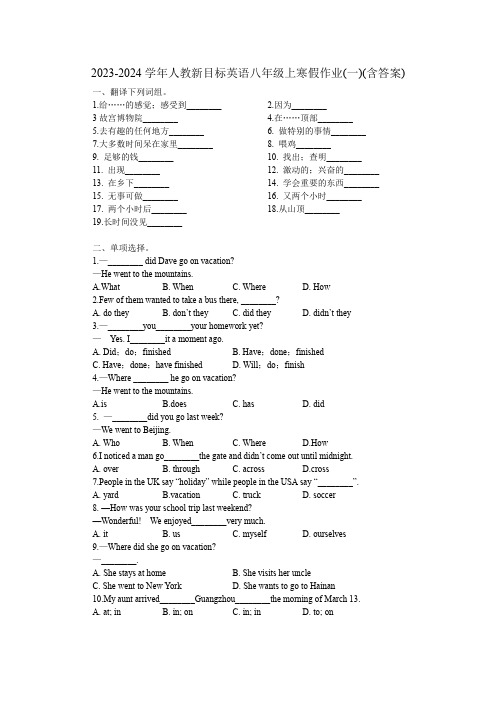
2023-2024学年人教新目标英语八年级上寒假作业(一)(含答案)一、翻译下列词组。
1.给……的感觉;感受到________2.因为________3故宫博物院________ 4.在……顶部________5.去有趣的任何地方________6. 做特别的事情________7.大多数时间呆在家里________8. 喂鸡________9. 足够的钱________ 10. 找出;查明________11. 出现________12. 激动的;兴奋的________13. 在乡下________14. 学会重要的东西________15. 无事可做________16. 又两个小时________17. 两个小时后________18.从山顶________19.长时间没见________二、单项选择。
1.—________ did Dave go on vacation?—He went to the mountains.A.WhatB. WhenC. WhereD. How2.Few of them wanted to take a bus there, ________?A. do theyB. don’t theyC. did theyD. didn’t they3.—________you________your homework yet?—Yes. I________it a moment ago.A. Did;do;finishedB. Have;done;finishedC. Have;done;have finishedD. Will;do;finish4.—Where ________ he go on vacation?—He went to the mountains.A.isB.doesC. hasD. did5. —________did you go last week?—We went to Beijing.A. WhoB. WhenC. WhereD.How6.I noticed a man go________the gate and didn’t come out until midnight.A. overB. throughC. acrossD.cross7.People in the UK say “holiday” while people in the USA say “________”.A. yardB.vacationC. truckD. soccer8. —How was your school trip last weekend?—Wonderful! We enjoyed________very much.A. itB. usC. myselfD. ourselves9.—Where did she go on vacation?—________.A. She stays at homeB. She visits her uncleC. She went to New YorkD. She wants to go to Hainan10.My aunt arrived________Guangzhou________the morning of March 13.A. at; inB. in; onC. in; inD. to; on三、完形填空。
八年级上册英语寒假作业答案

八年级上册英语寒假作业答案人教版八年级上册英语寒假作业答案为了保证孩子们过一个快乐的寒假充实的寒假,家长朋友们一定要监督孩子们的学习。
下面是应届毕业生店铺为大家搜索整理的人教版八年级上册英语寒假作业答案,希望对大家有所帮助。
l 一、1、junk program start differences exercises2、多久一次、至于、当然、照看、与······不同、on weekends、go to the movies 、twice a week 、my favorite singer、do morning exercises3、times 、skateboarding、eating、watches、surfing4、B、D、C、A、C、C、C、B、B、C、C、D、5、(1) How often (2) What (3) What’s favorite (4)doesn’t do any (5) doesn’t eat6、(1) I usually climb the hill on weekends.(2)I go to the movies once a year.(3)My brother plays soccer three or four a week.(4)She watches TV at home.(5)Yes, I am.7、healthy 、milk、often、day、like、much、why、good、think、tellin8、D、B、A、C、D、B、C、A、D、B9、B、B、D、B、10、(1)so fishing (2)meet (3) mare a meeting (4)clean (5) free (6) Friday、l 二1、balanced 、dentist、medicine、believe 、improve|、weak、2、 C、H、G、E、D、F、B、A、3、 (1) Stressed out、(2) stay healthy、(3) see a dentist、(4) drink tea with honey、(5) lie dews、rest (6) drink lots of water (7) eat anything go to bed early4、C、C、B、B、A、A、C、C、B、A、5、(1)It’s 、to (2) lots of (3) shouldn’t drink much water (4) What’s the matter with(5) When did 、arrive6、2-5-3-1-9-4-7-6-87、A、B、C、B、D、A、B、C、A、A 8、B、A、D、C、C、、C、D、B、A9、My friend Li Ming has a bad cold because he played football in the rain with his friends yesterday .The doctor told him to drink snore water and stay in bed to hare a good rest for two days. He has to ask for leave.l 三1、Weather、long、where、takes、fishing2、1.Sounds、2.doing、3. eating、times、4. watched、did watch、watched、5. does、reads3、B、D、A、B、B、C、C、D、D、A4、(1)don’t believe will (2) wrong with (3) may be (4) why comes5、C、A、C、C、B、A、B、A、B、A6、(1)B、A、B、B、C、(6) right how (7) They are staying here for fire days. (8) 他们尽力维持纪律。
八年级第一学期寒假作业

八年级英语寒假作业(一)I. 短语。
1. 多久一次______________________2. 在周末_________________3. 一个月三次_____________________4.一周两次________________5. 去看电影_____________________6.放学回家_________________7. 饮食习惯____________________8. 取得好成绩_______________9. 保持健康____________________10. 当然____________________ II. 根据句意及首字母提示补全单词。
1. He is very strong because he often e__________.2. My sister Mary usually goes skating on w__________.3. My favorite p__________ is the Talk Show.4. Bill isn’t good at math, so he can h________ answer the teacher’s questions.5. We can read some news on the I__________, it’s very easy.6. Jim is really a_______ and he exercises twice a day.7. ---Do you know the r_____ of the Chinese exam?---No, the teacher didn’t tell us.8. ---Is Barry in good h________? ---Y es, he often exercises.9. J______ food is not good for people’s health.10. A________ he is eighty years old, he is still very healthy.III. 用所给词的适当形式填空。
八年级英语上学期寒假作业
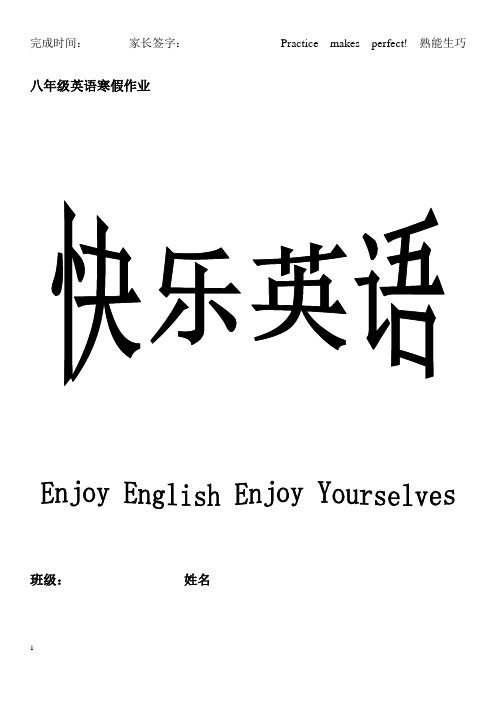
八年级英语寒假作业班级:姓名八年级上Unit1 Where did you go on vacation?句卡关键词汉语关键词英语汉语意思英语句型1. 去度假你去哪儿度假了?我去纽约市了。
2.没有人你和别人去的吗?不,这里没人。
每个人都在度假。
3. 什么特别的东西你买了什么特别的东西吗?是的,我为爸爸买了一些东西。
不,我没有买任何东西。
4.尝起来美味食物怎么样?每样东西尝起来真的很美味。
5.玩得开心每个人都玩得很开心吗?哦,是的。
一切都很好。
6. 什么有趣的地方你去什么有趣的地方了吗?7.很多我们在那里拍了好多照片8.看起来……一切看起来都很无聊9.决定做某事所以我们决定去宾馆附近的海滩10 享受做某事我非常喜欢在这座城市里散步11.如此……以至于我的腿很累以至于我想停下来12.感觉像我感觉我像一只鸟13.由于因为糟糕的天气,我们不能看到下面的任何东西。
14.足够的钱我爸爸没有带足够的钱15.当然-你去购物了吗?-当然去了。
16.差异一天的差异是多么大啊!温故知新篇17.活动‘愉快的什么活动让你感到愉快?18.建筑哪里有很多古老建筑19.想知道我在想这里过去的生活是什么样子呢。
20 湿我们没有雨伞,所以我们身上又湿又冷。
21大多数我大部分时间只是待在家里看书、休息。
22精彩的你看了黄果树瀑布了吗?是的。
很精彩的。
23你自己;们自己你、你们为什么没给自己买东西呢?八年级上Unit2句卡短语汉意短语汉语意思英语句型1忙的下周我想当的忙2. 踢足球至少他一周至少踢球两次3. 想要某人做某事我妈妈想让我喝它4.对……有好处她说她有益于我的健康5.多少你每天晚上睡多少个小时6.多久一次你多久喝一次牛奶?7.一周四到六次45%的学生一周锻炼四到六次8.例如,像像做运动这样的锻炼是很有意思的9.做……做好的方式我们认为放松的最好方式是通过锻炼。
10 超过多于她通常一天看两个多小时的电视11 去看牙医她从不去看牙医12.少于少于六小时13.在某方面帮忙他们经常帮忙做家务。
八年级上册寒假作业答案英语

八年级上册寒假作业答案英语下面是为大家整理的:八年级上册寒假作业答案英语,仅供参考,欢迎阅读!更多相关内容请继续关注八年级上册寒假作业答案英语第一一、1-5 DAABB 6-10 CCBCB 二、11.eyesight 12.smart13.secret 14.true 15.want三、16-20 DCADC 21-25 BACBA第二一、1.alone 2.helpful 3.heavy 4.hand 5.kind 6.teouble7.words 8.push 9.rest 10.both 11.tired 二、12-16 BDABB第三一、1-5 ADBBA 6-10 DACBC 二、11.keeps secrets 12.the same as 13.enjoyed himself 14.learned;by himself 15.took/caughta coach 三、16.called 17.girl 18.was born 19.gave 20.cleverst21.could 22.reading 23.his 24.something 25.swimming第四一、1.√ 2.sometime改成sometimes 3.√ 4.place改成places5.in改成at6.√7.In改成During8.most改成more9.eat改成eating 10.pupils前加the 二、略三、16-20 CDBDA第五一、1-5 BDDAB 二、6-10 CABAC 16-20 ABBCA第六一、1-5 BCADA 二、6-10 DBCBD 11-15 ACDAB 三、16.same17.listened 18.that 19.himelf 20.give 21.good 22.leaving 23.how 24.quietil 25.instead第七一、1.lent;hasn't given 2.reaches 3.did;do/was;doing 4.have forgotten 5.have;been 6.to bring 7.have;finished 8.Have;eaten9.find;Have;seen 10.has;spoken 二、11.At the age 12.you don't hurry; will be 13.may be 14.keep working 15.takes;much time to 三、16.In their eyes, we are always little ones and always do wrong things. 17. They only want us to give them good results in the exam. 18. They can talk with us and we can understand each other more and more.第八一、略二、A)1-5DCBAB B)6-10 AADCA第九一、1-5 BADAD 6-10 CBBBA 二、11.widely 12.throughout13.important 14.If 15.will 16.kinds 17.written eful 19.all 20.together第十一、略二、1-5 CACBA 6-10 BACCB 三、11-15 CDDDC第十一一、1.travel around the world 2.the best football team in the world 3.a square face 4.health activities 5.less than three times a week 6.最多50个学生 7.出席晨会 8.玩一整天 9.休一天假 10.穿校服二、11-15 BDCDB第十二一、1.If we don't protect those wild animals any more, there will be no more wild animals in the world. 2. If it doesn't rain, I will go out to play football. 3. If is very important for teachers to learn to encourage students. 4. Millie likes sharing her happiness with her friends. 5. I am going to Xiangtan with my parents to see red maple leaves next Sunday. 6. After school, I usually do after-school activities; sometimes I go to the tennis court to play tennis, sometimes I go swimming in the swimming pool. 7. I would like to be a social worker when I grow up. 8. We all like our history teacher because he has a good sense of humors. 9. What is anatural disaster? For example, the T aiwan earthquake last year killed thousands of people. 10. Our motherland is getting stronger and stronger, more and more beautiful. 二、11-15 ABBBBD第十三一、1-5 ADBCB 6-10 BDBAB 二、11-15 CABCD 三、16.but17.ideas 18.welcomed 19.surprised 20.doesn't 21.in 22.to 23.we 24.visits ually 26.or 27.friends' 28.times 29.for 30.saying第十四一、略二、1.mine 2.since 3.looking 4.animals 5.found6.needs7.enough8.end9.except 10.be put第十五一、1-5 CACBA 6-10 CCBAC 二、11.his改成her 12.to改成from 13.√ 14.in改成on 15.goes改成went 16.√ 17.in改成into18.That改成It 19.but改成and 20.kind改成kindly三、21-25CDBBC第十六一、1-5 CBDCB 6-10 BBBCB 二、11-15 CABDA。
八年级英语上册寒假作业(共四套附答案)
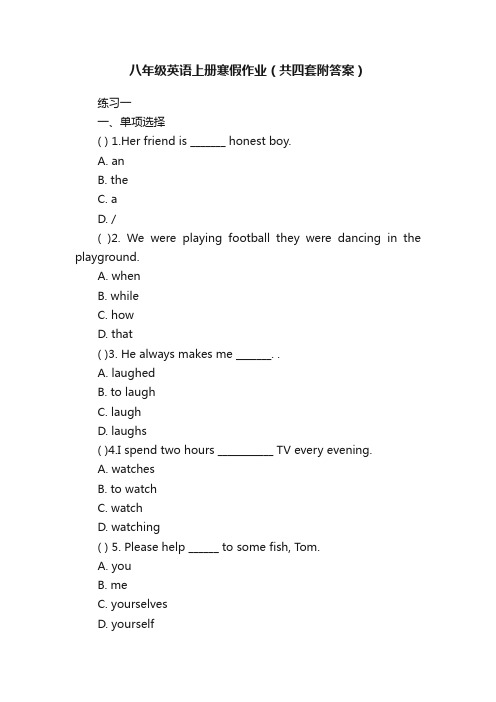
八年级英语上册寒假作业(共四套附答案)练习一一、单项选择( ) 1.Her friend is _______ honest boy.A. anB. theC. aD. /( )2. We were playing football they were dancing in the playground.A. whenB. whileC. howD. that( )3. He always makes me _______. .A. laughedB. to laughC. laughD. laughs( )4.I spend two hours ___________ TV every evening.A. watchesB. to watchC. watchD. watching( ) 5. Please help ______ to some fish, Tom.A. youB. meC. yourselvesD. yourself( )6. He bought a TV. The sentence structure is ________.A. S+VB. S+V+PC. S+V+IO+DOD. S+V+DO( )7. Tom and Lily_____ in that English party.A. enjoy themselvesB. enjoyed themselvesC . enjoyed ourselves D. enjoyed yourselves( )8. Look! They _____ a day out in the classmate..A. plannedB. planC. are planningD. are planing( ) 9.The football match was put off _______the heavy rain. X|k |B | 1 . c|O |mA. becauseB. ifC. soD. because of( )10. There are almost no trees there. Animals have __________to hide.A. anywhereB. somewhereC. enough spaceD. nowhere ( )11. I don‘t know if he will come tomorrow . If he _______, I will tell him about it .A. will comeB. comesC. comeD. is coming( ) 12. Everyone should do something ________wild animals.A. protectingB. to protectC. protectD. to protecting( ) 13. —Do you want to go fishing this Sunday?—Y es, if the weather ________fine.A. will beB. wasC. isD. would be( ) 14.The old man looks ________. He is looking at his dying dog ___________.A .sadly; sadlyB .sadly; sad C. sad; sad D. sad; sadly( ) 15. The number of the workers in the factory ________ over 2,200.A. hasB. haveC. areD. is二、完形填空:Mrs. White had a lovely cat, and it was the cat‘s first winter. One evening, it was cold outside when it began to snow _ 1__. Mrs. White looked everywhere and shouted its name, but she couldn‘t __2__ it. So she ___3__ the police and said, ―I lost my cat. Did anyone find one?‖ ―No, Madam,‖ answered the policeman at the other end, ―I‘ll rin g you up if _4 finds it. By the way, _5__is your cat?‖ ―White.‖ ―I think it_6 _in the snow. But don‘t worry. I know cats are really very strong animals. They sometimes live for a few days in the snow, and until it melts(融化) or somebody finds them, they are quite all right.‖ Mrs. Whit e felt __7__ when she heard this, ―Yes, yes, I think you are right,‖ she said, ―and our cat are very clever. She is __8__ than any other cat. She can almost talk.‖ The policeman was getting rather tired. ―Well, then,‖ He said,―why don‘t you __9__ your tel ephone? Perhaps she is trying to __10 _ you now!‖ X k B 1 . c o m( )1.A. heavily B. strong C. thick D. heavy( )2.A. find B. look for C. find out D. found( )3.A. told B. asked C. called D. spoke( )4.A.no one B. someone C. someone D. everyone( )5.A. where B. What colour C. which D. When( )6.A. may be B. maybe C. be D. may( )7.A. happy B. sad C. unhappy D. worried( )8.A. more cleverer B. much cleverer C. clever D. much more clever( )9.A. write down B. put down C. take down D. sit down( )10.A. called B. calls C. calling D. call三、阅读理解AAirline(航空公司)Flight number Destination(终点)Departure(离开)timeGateAir Canada 137 Beijing 10.12a.m. 24Japan Airlines 320 Tokyo 10.30a.m. 18Airways405 Paris 11.00a.m. 20Pan American 226 London 11.20a.m. 12Pan American 12 Beijing 11.43a.m. 15Air Canada 178 Tokyo 12.32p.m. 21CAAC 289 Hong Kong 12.32p.m. 14( )1. If you want to fly to Paris, you should take________.A. Flight 137B. Flight 320C. Flight 226D. Flight 405( )2. Flight 289 to Hong Kong leaves at_______.A. 11.43a.m.B. 10.12a.m.C. 10.12a.m.D. 12.32p.m. ( )3. A lady wants to take Flight 12 to Beijing, she should go to Gate________.A. 15B. 14C. 12D. 18( )4. Flight 226 to London is from _________.A. Pan AmericanB. Japan AirlinesC. Air CanadaD. CAAC ( )5. A man is at Gate 18. He‘s going to________.A. TokyoB. Hong KongC. LondonB新课标第一网Jack worked in an office in a small town. One day his boss(老板) said to him, ―Jack, I want you to go to London to see Mr. Brown in his office.‖ Jack went to London by train. He left the station, and thought, ―The office isn‘t far from the station. I‘ll find it easily. But after and hour he was still looking for it, so he stopped and asked an old lady. She said ―Jus t go along the street, turn to the left at the end, and it‘s the second building on the right.‖ Jack went and found it. A few days later he went to the same city to visit the same person. But again he did not find the office, so he asked someone on his way. It was the same lady! She was very surprised and said, ―Are you still looking for the place?‖( )6. Where did Jack work?A. In London.B. in a big factoryC. In a small townD. In the train.( ) 7. Why did Jack go to the office in London?新课标第一网A. To see his boosB. To see an old lady.C. To see Mr. Brown.D. To see an officer.( ) 8. Where was Mr. Brown‘s office?A. In a small town.B. Far from the station.C. Far from London.D. In a building.( ) 9. How did Jack go to London?A. By plane.C. On footD. By train( ) 10. Why was the old lady surprised to see Jack again?A. Because Jack asked her the same way again.B. Because Jack was her old friend.C. Because Jack was her neighbour.D. Because the old lady thought Jack was still looking for the place.四、根据句意及所给汉语提示完成句子:1. One of the boys__________( do) his homework when I came into the classroom.2.If it__________(be) sunny tomorrow, I will walk to school .3.She was singing in the room while her brother __________(watch) TV.4.We should encourage farmers__________ (leave) the giant pandas more reserves.5. If you don‘t study hard, you ______ (not pass) the exam.6 .Bad weather can cause ______ (nature) disasters.7. Birds can find food ___________(容易地)in Zhalong .8. Many people don't understand the___________(重要性) of the wetland.五、根据句意,用所给动词词组的正确形式填空。
八年级英语上册寒假作业答案
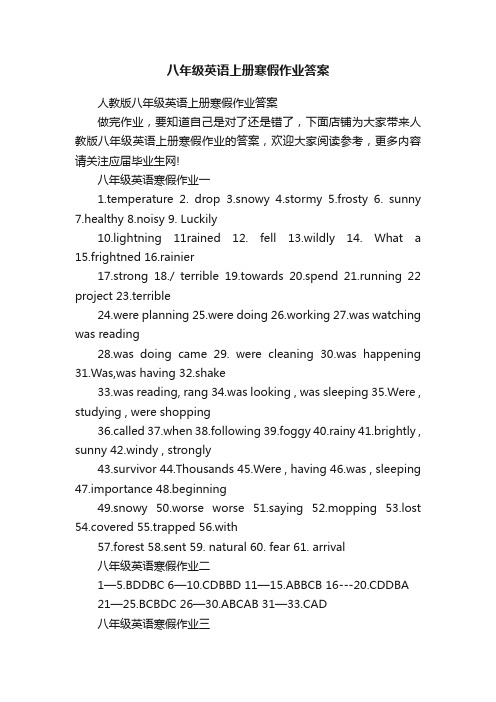
八年级英语上册寒假作业答案人教版八年级英语上册寒假作业答案做完作业,要知道自己是对了还是错了,下面店铺为大家带来人教版八年级英语上册寒假作业的答案,欢迎大家阅读参考,更多内容请关注应届毕业生网!八年级英语寒假作业一1.temperature2. drop3.snowy4.stormy5.frosty6. sunny7.healthy8.noisy9. Luckily10.lightning 11rained 12. fell 13.wildly 14. What a 15.frightned 16.rainier17.strong 18./ terrible 19.towards 20.spend 21.running 22 project 23.terrible24.were planning 25.were doing 26.working 27.was watching was reading28.was doing came 29. were cleaning 30.was happening 31.Was,was having 32.shake33.was reading, rang 34.was looking , was sleeping 35.Were , studying , were shopping36.called 37.when 38.following 39.foggy 40.rainy 41.brightly , sunny 42.windy , strongly43.survivor 44.Thousands 45.Were , having 46.was , sleeping 47.importance 48.beginning49.snowy 50.worse worse 51.saying 52.mopping 53.lost 54.covered 55.trapped 56.with57.forest 58.sent 59. natural 60. fear 61. arrival八年级英语寒假作业二1—5.BDDBC 6—10.CDBBD 11—15.ABBCB 16---20.CDDBA 21—25.BCBDC 26—30.ABCAB 31—33.CAD八年级英语寒假作业三A1-5 DCADC 6-10 ACDBAB1-5 CCBAD 6-10 BBAACC1-5 CBAAB 6-10 DCCDA八年级英语寒假作业四A1-4 AACBB1-5 ADADB寒假作业答案:五ABCAA CABBB寒假作业答案:六(A)Three Kids,13,WY PLAY HOUSEWEST YORKSHIRE ,2:00 PM,1St No.11(B)Dahua Company. Mr. White Oct 21 9:30 am talk about(C)The King Family,12 March,Flight,morning, four/4(D)Atmosphere, oxygen, carbon dioxide, weight, sun’s heat, expands八年级英语寒假作业七根据短文内容和首字母填空。
年人教版八年级上英语寒假作业

年人教版八年级上英语寒假作业
导言
本文档为年人教版八年级上英语寒假作业,旨在帮助学生巩固和复寒假期间所学的英语知识。
作业内容涵盖了本学期研究的各个单元,帮助学生巩固对相关知识的掌握。
作业要求
本次寒假作业共分为以下几个部分,具体要求如下:
词汇练
针对本学期所学的重点词汇,进行词汇练。
学生需要根据给定的中文或英文释义写出对应的单词。
完形填空
根据给定的短文,在空格处填入最恰当的单词,使短文意思完整、通顺。
阅读理解
阅读给定的短文或对话,回答相应的问题。
书面表达
以"我的寒假生活"为题,写一篇80词左右的短文,介绍自己在寒假期间的生活、活动和感受。
提交方式
学生需要将完成的寒假作业整理成文档或纸质材料,按照学校规定的提交时间和方式进行提交。
注意事项
1. 请学生独立完成寒假作业,不要抄袭或参考他人答案。
2. 请学生按照规定的字数要求完成书面表达部分。
3. 请学生在整理作业时保证作业的整洁与规范。
学生们在假期中认真完成寒假作业,将会对巩固和提高英语水平有很大的帮助。
祝愿大家度过一个愉快而充实的寒假!。
(完整word版)八年级英语寒假作业.doc
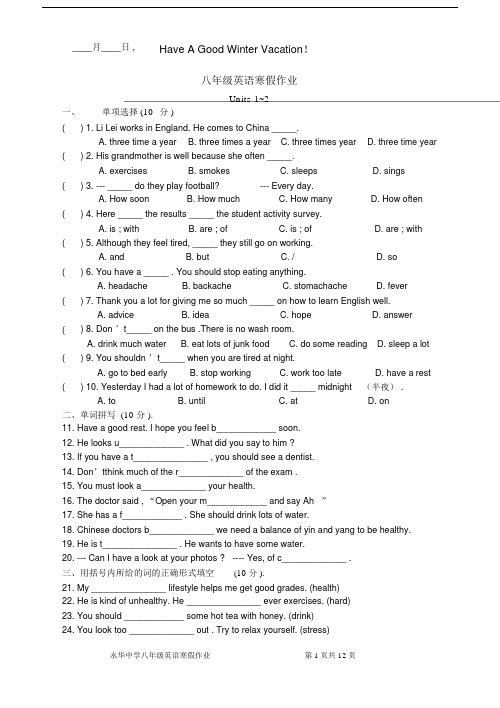
____月____日 , Have A Good Winter Vacation!八年级英语寒假作业Units 1~2一、单项选择 (10 分 )( ) 1. Li Lei works in England. He comes to China _____.A. three time a yearB. three times a yearC. three times yearD. three time year ( ) 2. His grandmother is well because she often _____.A. exercisesB. smokesC. sleepsD. sings( ) 3. --- _____ do they play football? --- Every day.A. How soonB. How muchC. How manyD. How often ( ) 4. Here _____ the results _____ the student activity survey.A. is ; withB. are ; ofC. is ; ofD. are ; with ( ) 5. Although they feel tired, _____ they still go on working.A. andB. butC. /D. so( ) 6. You have a _____ . You should stop eating anything.A. headacheB. backacheC. stomachacheD. fever ( ) 7. Thank you a lot for giving me so much _____ on how to learn English well.A. adviceB. ideaC. hopeD. answer ( ) 8. Don ’t_____ on the bus .There is no wash room.A. drink much waterB. eat lots of junk foodC. do some readingD. sleep a lot ( ) 9. You shouldn ’t_____ when you are tired at night.A. go to bed earlyB. stop workingC. work too lateD. have a rest ( ) 10. Yesterday I had a lot of homework to do. I did it _____ midnight (半夜) .A. toB. untilC. atD. on二、单词拼写 (10 分 ).11.Have a good rest. I hope you feel b____________ soon.12.He looks u_____________ . What did you say to him ?13.If you have a t_______________ , you should see a dentist.14.Don’tthink much of the r_____________ of the exam .15.You must look a_____________ your health.16.The doctor said , “Open your m____________ and say Ah ”17.She has a f____________ . She should drink lots of water.18.Chinese doctors b_____________ we need a balance of yin and yang to be healthy.19.He is t_______________ . He wants to have some water.20.--- Can I have a look at your photos ? ---- Yes, of c_____________ .三、用括号内所给的词的正确形式填空(10 分 ).21.My _______________ lifestyle helps me get good grades. (health)22.He is kind of unhealthy. He _______________ ever exercises. (hard)23.You should ____________ some hot tea with honey. (drink)24.You look too _____________ out . Try to relax yourself. (stress)____月____日 ,Have A Good Winter Vacation!25.Chinese medicine is popular in many _______________ countries. (west)26.Mom ____________ me to eat more vegetables. (want)27.Alice is tired and has a lot of _______________ . (head)28.You must try to eat _______________ meat and exercise every day. (little)29.A cat has four _____________ . (foot)30.What about _____________ every morning ? (run)四、根据中文意思,完成下列句子,每空填一词。
【精品文档】八年级上期英语寒假作业的内容word版本 (2页)
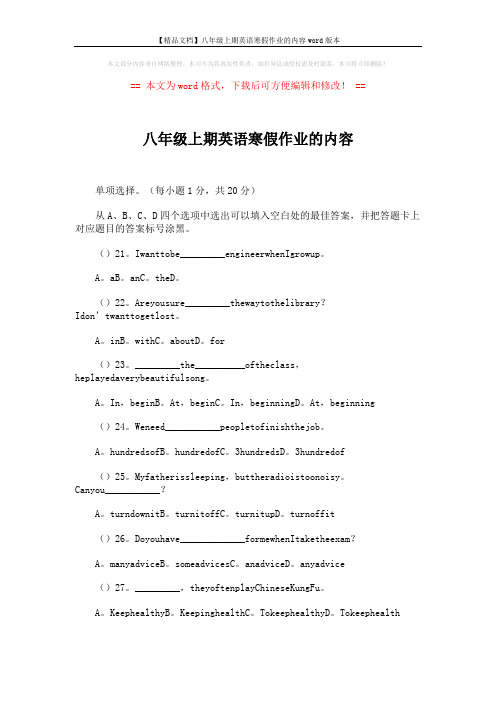
()24。Weneed___________peopletofinishthejob。
A。hundredsofB。hundredofC。3hundredsD。3hundredof
()25。Myfatherissleeping,buttheradioistoonoisy。Canyou___________?
A。KeephealthyB。KeepinghealthC。TokeephealthyD。Tokeephealth
()28。———__________doyouspeakEnglishsowell?
———Bytalkingtoforeignersalot。
A。WhenB。WhatC。WhereD。How
()29。LiPing__________swimwhenhewasonly5。
A。canB。willC。isabletoD。wasableto
()30。__________theroomuntilyoufinishallyourwork。
A。Don’tleaveB。LeaveC。LeavesD。Toleave
()31。It’sunhealthytosleepwithallthewindows___________。
A。closeB。closingC。closesD。closed
()32。Mike’smomisill。Heis_ቤተ መጻሕፍቲ ባይዱ_________herathome。
A。lookingforB。lookedafterC。lookingafterD。lookedat
A。On,goB。In,willgoC。On,willgoD。At,aregoing
八年级英语上寒假作业

八年级上册寒假作业2021要求:把给出的知识点标画出来,给出的题目全部做上Unit 1 When was he born?Section A1(1a-2d) 导学案查阅下面的短语:1)击球_______________ 2)网球运发动_______________3)站在冰盒里_______________ 4)站在一座高塔上_______________5)开场做某事_______________ 6)有出色才艺的人_______________7)崇拜某人_______________ 8)一个街额头艺术家_______________9)绘画_______________ 10)在地面或建筑物上_______________11〕一个大学生 12〕遇到费事句子翻译:1.她是什么时候出生的?她出生于1996年。
2.大卫·布莱恩在一个冰盒里占了多久?3.它是关于一个有出色才艺的人的节目。
4.这些画看起来三级如此真实而且立体感很强。
开场画画时他多大了?费事。
7.我想知道我是否能像那样学绘画。
那么酷!1. when he was four years old.=at the age of four2. too…..to 太…..而不能….,多表示否认,可以与so …that(转换时that 后从句用否认形式)He is so young that he can’t go to school= He is too young to go to school练习:1.she is young go to school2.It’s too difficult for me to read this passage.It’s difficult I read this passage.3. spend some time (in) doing sth 花费某些时间做某事spend some time on sth 花费某些时间在某事上4.start用法,看下面的例句:He started playing the piano when he was 5 years old.She is starting to cook the dinner.总结其用法,start 后可接和按要求改写句子1. Jim was born in 1981. (画线提问)___________________2. He stood in the box of ice for 2 days. (画线提问)______________________3. He stopped playing football in 1992.(否认句)________________________4. They visited the museum last year._______ _______ they ______ last year? (画线提问)Unit 1 Could you please clean your room?Section A2(3a-4c) 导学案以下翻译练习1.中国作家2.2021年的诺贝尔文学奖3.期待做某事13.太···以致17.〔出版〕22.茅盾文学奖 23.对···感兴趣24.当他听到这个消息时,莫言说他从未期待获奖,因为全世界有那么多的优秀作家。
八年级上英语寒假作业
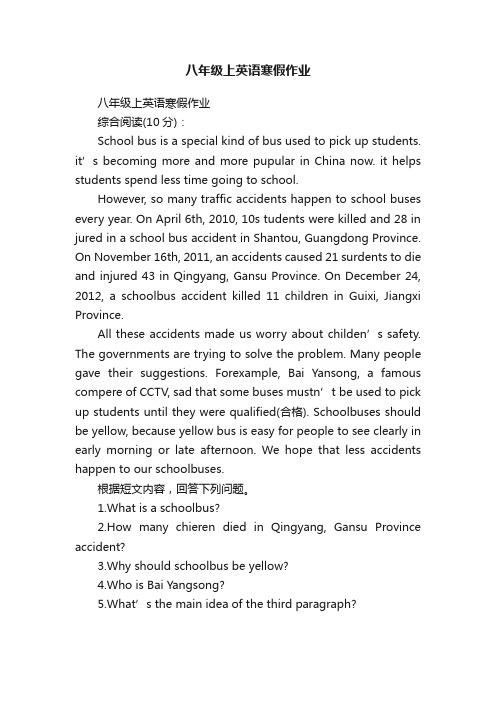
八年级上英语寒假作业八年级上英语寒假作业综合阅读(10分):School bus is a special kind of bus used to pick up students. it’s becoming more and more pupular in China now. it helps students spend less time going to school.However, so many traffic accidents happen to school buses every year. On April 6th, 2010, 10s tudents were killed and 28 in jured in a school bus accident in Shantou, Guangdong Province. On November 16th, 2011, an accidents caused 21 surdents to die and injured 43 in Qingyang, Gansu Province. On December 24, 2012, a schoolbus accident killed 11 children in Guixi, Jiangxi Province.All these accidents made us worry about childen’s safety. The governments are trying to solve the problem. Many people gave their suggestions. Forexample, Bai Yansong, a famous compere of CCTV, sad that some buses mustn’t be used to pick up students until they were qualified(合格). Schoolbuses should be yellow, because yellow bus is easy for people to see clearly in early morning or late afternoon. We hope that less accidents happen to our schoolbuses.根据短文内容,回答下列问题。
- 1、下载文档前请自行甄别文档内容的完整性,平台不提供额外的编辑、内容补充、找答案等附加服务。
- 2、"仅部分预览"的文档,不可在线预览部分如存在完整性等问题,可反馈申请退款(可完整预览的文档不适用该条件!)。
- 3、如文档侵犯您的权益,请联系客服反馈,我们会尽快为您处理(人工客服工作时间:9:00-18:30)。
1八年级上册英语寒假作业翻译各单元的短语和习惯用语,认真阅读词语辨析及重点语法Unit 1 Where did you go on vacation?重点短语:(1(2(3(4(5(6(7(8(9(10(11(12(13(14(15(16(17(18(19(20(21(22(23(24(25(26重点语法:(1)Where did you go on vacation? I went to New York City.(2)Did you go out with anyone? No, No one was here. Everyone was on vacation. (3)Did you buy anything special? Yes, I bought something for my father.(4)How was the food? Everything tasted really good.(5)Did everyone have a good time? Oh,yes. Everything was excellent.习惯用法:(1)buy sth for sb./ buy sb. Sth(2)taste + adj.(3)nothing ….but + V.(原形)(4)seem + (to be) + adj(5). arrive in + 大地方arrive at + 小地方(6)decide to do sth.(7). try doing sth.(8)try to do sth.(9)try one`s best to do sth(10)enjoy doing sth.(11)want to do sth.(12)start doing sth.(13)stop doing sth.stop to do sth(14)look + adj(15)dislike doing sth.(16)Why not do sth(17)so + adj + that + 从句(18)tell sb. (not) to do sth.(19)keep doing sth.(20).forget to do sth. forget doing sth 词语辨析:○1anywhere 与somewhere 两者都是不定副词。
anywhere 在任何地方,常用于否定句和疑问句中。
I can’t find it anywhere.somewhere 在某处,到某处,常用于肯定句。
I lost my key somewhere near here.○2seem + 形容词看起来…..You seem happy today.seem + to do sth. 似乎、好像做某事I seems / seemed + that来好像…;似乎….seem like ….好像,似乎…..It seems like a god idea. ○3decide to do sth.决定做某事They decide to visit the museum.decide + 疑问词+ 动词不定式He can not decide when to leave.○4start doing sth = start to do sth. 开始,可与begin 互换。
He started doing his homework. ○5over 介词,多于,超过,在…以上(表示数目、程度)= more thanMy father is over 40 years old.○6. too many 太多,后接可数名词复数:Mother bought too many eggs yesterday.too much 太多,修饰不可数名词,修饰动词作状语。
We have too much work to do.Don’t talk too much.○7because of 因为,由于,后接名词、代词或动名词,不能接句子。
He can’t take a walk because of the rain.because 连词,因为,引导状语从句,表示直接明确○8too,…to太….以至于不能….Mother is too tired to go to school.○9have fun doing sth享受做某事的乐趣Unit 2How often do you exercise? 短语:(1)(22)be good at doing sth(24)in one’s free time2(29)old habits die hard(31)垃圾食品(32)照料某人(33)look after sb(35)get in…语法要点:(1)What do you usually do on weekends? I always exercise.(2)What do they do on weekends? They often help my mother with housework. (3)What does she do on weekends? She sometimes goes shopping.(4)How often do you go to the movies? I go to the movies maybe once a month. (5)How often does he watch TV? He hardly ever watches TV.(6)Do you go shopping? No, I never go shopping.习惯用法:1. help sb. with sth=have sb do sth2. How about doing…?3. want sb. to do sth.4. How many + 可数名词复数+ 一般疑问句5. 主语+ find+ that 从句发现…6. It’s + adj.+ to do sth. 做某事是….的7. spend time with sb. 和某人一起度过时光8. ask sb. about sth. 9. by doing sth. 通过做某事10. What’s your favorite…..?11 start doing sth.12. the best way to do sth.13.full of14.what about doing sth?I don`t like it at all. 我一点儿也不喜欢它。
词语辨析:1. free 空闲的,有空的,反义词为busy.be free 有空,闲着,相当于have time.I’ll be free next week. = I’ll have time next week. 2. How come?怎么会?怎么回事?表示某件事情很奇怪,有点想不通;可单独使用,也可引导一个问句,相当于疑问句why, 但how come 开头的特殊疑问句使用的仍然是陈述语序。
How come Tom didn’t come to the party? = Why didn’t Tom come to the party?3. stay up late 指“熬夜到很晚,迟睡”。
Don’t stay up late next time.stay up 指“熬夜,不睡觉”。
He stayed up all night to write his story.4. go to bed 强调“上床睡觉”的动作及过程,但人不一定睡着。
I went to bed at eleven last night.go to sleep 强调“入睡,睡着,进入梦乡”。
She was so tired that she went to sleep soon.5. find + 宾语+名词, 发现:We have found him (to be) a good boy.find + 宾语+ 形容词,发现:He found the room dirty.find + 宾语+ 现在分词,发现:3I found her standing at the door.6. percent 百分数,基数词+ percent:percent 没有复数形式,作主语时,根据所修饰的名词来判断谓语的单复数。
Forty percent of the students in our class are girls. Thirty percent of time passed.7. more than 超过,多于,不仅仅,相当于over. 在句型转换中考查两者的同义替换。
反义词组为:less than.I lived in Shanghai for more than / over tenyears.8. afraid 形容词,担心的,害怕的,在句中作表语,不用在名词前作定语。
I’m afraid we can’t come here on time.be afraid of sb / sth 害怕某人/ 某事;be afraid of doing sth. 害怕做某事。
Some children are afraid of the dark.Don’t be afraid of asking question.I’m afraid + 从句,恐怕,担心:I’m afraid I have to go now.9. sometimes , sometime, some times , some time 的区别:sometimes 频度副词,有时。
sometime 副词,某个时候。
some times 名词词组,几次,几倍。
其中time 是可数名词,对它提问用how many times.times have you read the story?some time 名词短语,一段时间. 表示“一段时间”时10.how often 多久一次,用来提问动作发生的频率。
回答用:once,twice, three times 等词语。
How often do you play sports? Three times a week.how long 多长,用来询问多长时间,也可询问某物有多长。
How long does it take to get to Shanghai from here? How long is the ruler?how far 多远,用来询问距离,指路程的远近。
How far is it from h ere to the park? It’s about 2 kilometers.Unit 3 I’m more outgoing than my sister 短语归纳与用法:(1))as…as…(2)the singing competition (16)be similar to (3)the same as (17)be different from (4)care about (18)be like a mirror (5)the most important (19)as long as(6)bring out (20)get better grades4(7)reach for (21)in fact(8)交朋友(22)the other(9)感动某人(23)be talented in music(10)擅长…… (24)be good with(11)have fun doing sth. (25)be good at doing sth(12)make sb. do sth. (26)want to do sth.(13)as+adj./adv.的原级+as (14)It’s+ adj.+for sb. to do sth.语法知识:(1)Is Tom smarter than Sam? No,he isn’t. Sam is smarter than Tom.(2)Is Tara more outgoing than Tina? No, she isn’t. Tina is more outgoing than Tara.(3)Ar e you as friendly as your sister? No, I’m not. I’m friendlier.(4)Does Tara work as hard as Tina? Yes, she does.(5)Who’s more hardworking at school? Tina thinks she works harder than me.词语辨析:(1)laugh v. & n. 笑He laughs best who laughs last.谁笑在最后,谁笑得最好。
